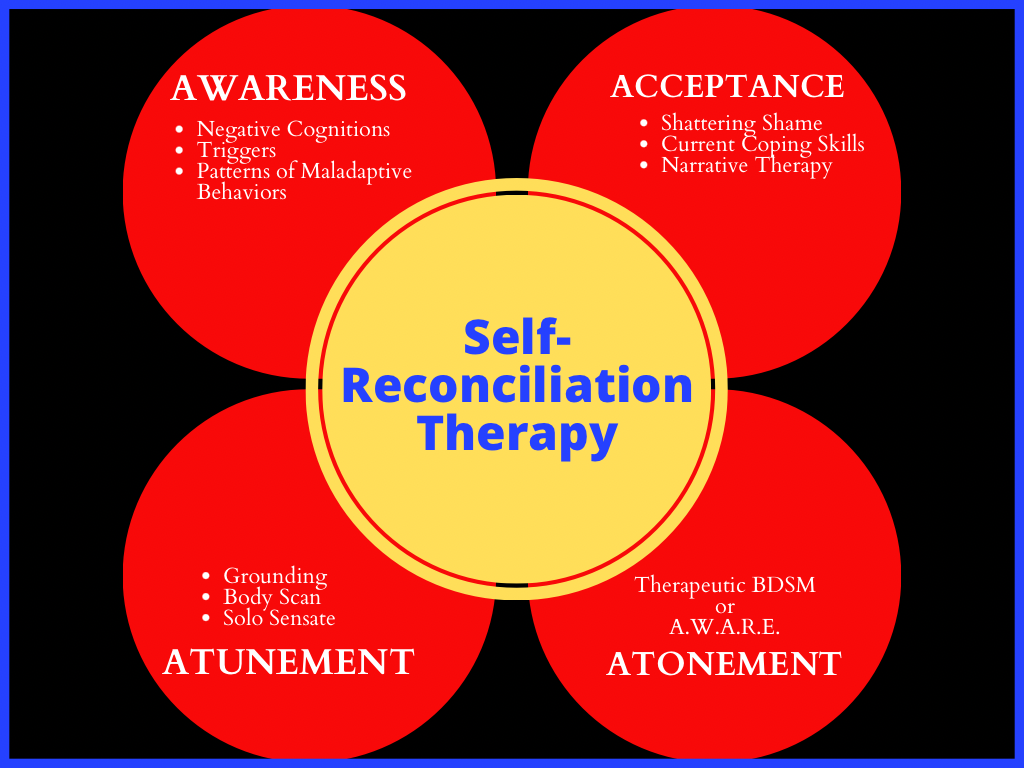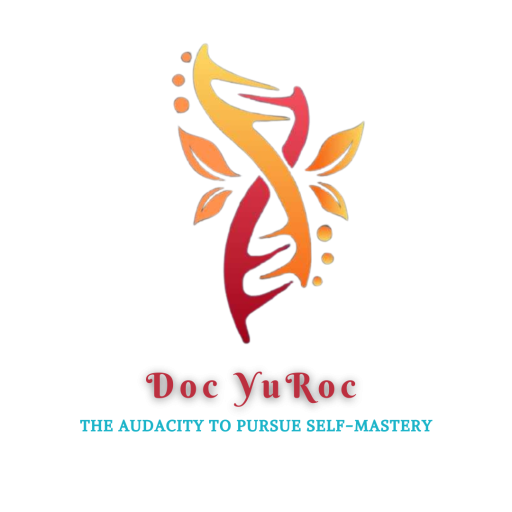Self-Reconciliation Therapy (SRT): Healing Through Embodied Awareness
A certification program for licensed mental health professionals.
✔ Grounded in somatics, attachment, and trauma theory
✔ Focuses on internal reconciliation, nervous system regulation, and clinical collaboration
✔ Prepares clinicians to ethically support clients who engage in Therapeutic BDSM™
This is for therapists ready to expand their clinical toolkit and hold space for nontraditional, body-based healing work.
The Four Pillars of Self-Reconciliation Certification
SRT is structured around four foundational pillars that support the journey of healing:
Awareness:
Cultivating conscious knowledge of one’s own character, feelings, motives, and desires.
Acceptance:
Embracing one’s experiences without judgment, acknowledging all attributes, positive and negative.
Attunement:
Harmonizing the mind, body, and spirit by being responsive to internal states and needs.
Atonement:
Taking action to reconcile with oneself, addressing past wrongdoings through restorative practices.

The Guide: "A Power Exchange with Your Pain"
This guide serves as a comprehensive resource for both individuals and practitioners. It offers:
-
Educational content on trauma and healing.
-
Practical exercises aligned with the four pillars.
-
Insights into the integration of Therapeutic BDSM as a healing modality.
The guide can be used independently or alongside a trained practitioner for enhanced support.

Core Principles of the Self-Reconciliation Therapy Certification Program
Somatic Processing
SRT emphasizes the connection between mind and body, recognizing that trauma is often stored in the body as physical sensations, tension, or dysregulation. Techniques in SRT aim to help clients identify and release this stored trauma through mindful awareness of bodily sensations.
Trauma-Informed
SRT is grounded in trauma-informed care, ensuring that clients are treated with an understanding of how trauma affects the brain, emotions, and body. It provides a safe space for clients to work through their trauma without re-traumatization.
Self-Acceptance and Compassion
One of the main goals of SRT is to help clients reconcile with themselves, often by fostering self-compassion. This involves accepting one’s emotions, behaviors, and trauma responses without judgment and understanding the roots of these feelings and reactions.
Rescripting and Reprocessing
In SRT, clients are guided through exercises and interventions that allow them to “rescript” their relationship with their trauma. This might involve revisiting past experiences in a controlled environment, often in collaboration with a clinician, to change the emotional narrative around the trauma and create new, more empowering associations.
Integration of Experience
A major focus of SRT is helping individuals integrate their traumatic experiences into a cohesive sense of self. This means that instead of the trauma causing fragmentation or disconnection, it becomes something that is acknowledged and understood as part of the individual’s story, leading to healing and wholeness.
Self-Regulation
SRT helps clients develop self-regulation skills, teaching them how to manage emotional distress, anxiety, or dysregulation that stems from trauma. These techniques help clients regain control over their responses to triggers and overwhelming emotions.
Training & Certification
For professionals interested in incorporating SRT into their practice, training and certification are available through the Kink Professional Standards Alliance (KPSA). This ensures adherence to ethical standards and cultural competence in delivering SRT.
The certification is a three month hybrid program consisting of asynchronous content, live discussions, case studies, reflections, integration, and final exmination.
Program is currently $997. Click below for more information and access to application.
Self- Reconciliation Therapy Program
Foundations of Self Reconciliation & Therapeutic BDSM
Sets the foundation for understanding Self-Reconciliation & Therapeutic BDSM™ as an applied intervention for healing, empowerment, and embodiment. Introduces the core principles of Self-Reconciliation Therapy (SRT) and explores how Therapeutic BDSM™ can serve as a structured, trauma-informed intervention, distinct from traditional therapy and recreational BDSM,
Bias & Assessing Readiness for Therapeutic BDSM™
Participants will learn how to assess a client’s psychological and somatic readiness for Therapeutic BDSM™ through a trauma-informed lens. This includes understanding attachment wounds, emotional regulation, dissociation, and self-awareness levels as key factors in client suitability.
Trauma, Dissociation, and Emotional Regulation in Therapeutic BDSM™
Participants will explore the neurobiological and psychological impact of trauma in the context of Therapeutic BDSM™.
Power Dynamics, Consent, and Ethical Boundaries
We’ll examine how early relationships influence attachment styles, how these patterns show up in submission, dominance, and scene dynamics, and how Pros can use BDSM as a tool for trust-building, self-regulation, and healing.
Scene Structuring, Collaboration, and Client Integration
Participants will learn how to apply titration techniques, assess somatic attachment repair, and ensure that clients engage in BDSM from a place of self-reconciliation rather than reenactment.
Collaboration, Communication and Beyond: The Integrated Practice of Therapeutic BDSM
Clinicians, educators, and pro practitioners will explore collaborative strategies within the Tetralogical Model, focusing on role clarity, ethical boundaries, documentation, and client-centered communication. Through applied case studies, reflective exercises, and live role-play (where applicable), this module prepares participants to implement Therapeutic BDSM™ as a coordinated, trauma-informed, and ethically sound intervention.
Ready to explore Self-Reconciliation Therapy for yourself or your clients?
Let’s co-create a path toward embodied healing and self-reclamation.
→ [Schedule a Consultation]
→ [Learn About Training & Certification]
